Mother-and-baby homes: 'Secrets have been shattered'
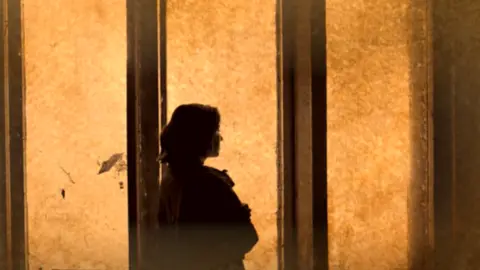 BBC
BBCWere it not for the bravery of survivors, what happened in mother-and-baby homes and Magdalene Laundries would have largely remained hidden in history.
But secrets have been shattered - and the power of shame broken - by the testimonies of people who suffer trauma to this day.
The last institution in Northern Ireland closed only in 1990.
At least 10,500 women spent time in a mother-and-baby home from 1922 until that point.
One of them was the birth mother of Fionnuala Boyle, from Galbally in County Tyrone.
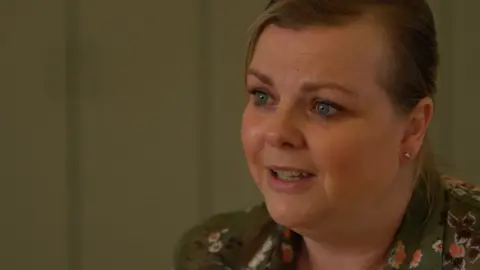
Fionnuala said her adoptive parents gave her a "charmed childhood".
But that has driven her all the more to "get justice" for her brother, Paul, who died as a baby.
"I feel he didn't get the same chance as I did because somebody somewhere thought he wasn't worthy of it," she explained.
'Crushed me'
When she turned 18, Fionnuala began her search to find out more about her birth family.
She always knew she had a brother, but was devastated to discover his life had been short.
"The day I got Paul's birth certificate, I also got his death certificate," she said.
"That just crushed me.
"Whenever you are an only child, siblings become extremely important to you.
"The thought that there was someone else out there was always a big dream, if you like."
After a few years, Fionnuala learned Paul had been buried at Milltown Cemetery in west Belfast.
The process of finding information was "far from easy", but eventually she received "more intensive help" and located her brother's resting place.
However, she "wouldn't call it a grave".
"It was more of a pit - because more than 30 babies were in the spot where he was buried," she said.
"I think that notion was the most traumatic and the most sickening thing for me - that they were all thrown in together, in un-consecrated ground, in a bog, at the bottom of a cemetery - like they didn't matter.
"I just think it's so wrong."
Paul would have had his 50th birthday in August.
So over the summer, Fionnuala had a headstone put up for him.
"I was delighted that finally he had his name emblazoned in marble.
"That's what he always should have had."
Now Fionnuala's children visit the grave and "call him uncle Paul".
"That's lovely for me, but it's heart-breaking at the same time, because that's the part that people don't see.
"And that's why we're all crying out for acknowledgement that these things have happened.
"There's this notion that because these things happened years ago, that the modern generation aren't affected by it - and that's not true."
'Like a prison'
Academic research published in January found that the youngest girl recorded as being admitted to a mother-and-baby home was 12 years old.
I have spoken to a woman who was also sent to the Marianville home in Belfast in the early 1970s, when she became pregnant at the age of 16.
She remembered it as being "like a prison", with a "regimented routine" beginning with Mass at six o'clock in the morning.
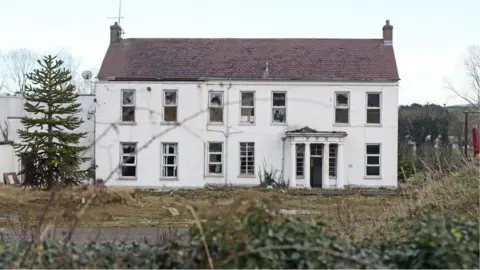 PA Media
PA MediaThe survivor said her baby was "never mentioned" when she went back to her family.
Not long afterwards she was raped and became pregnant again.
She was put in another mother-and-baby home - Marianvale, in Newry, County Down.
The woman told me she had "lived with the shame all of her life" and has suffered from mental and physical health problems as a result.
Marianville and Marianvale also had Magdalene Laundries - workhouses where women were sent for a variety of reasons, including for having a child outside of marriage.
Both institutions were run by an order of nuns, the Good Shepherd Sisters.
Another site owned by the order - St Mary's in the Waterside area of Londonderry - also had a laundry; as did the Thorndale complex in north Belfast, which was run by the Salvation Army.
Women and girls were sent to the laundries by their families, welfare authorities, the courts, police, clergymen and church organisations.
That was established by the researchers who compiled the report which was released earlier this year- and has led to the devolved government's decision that an independent investigation will be held.
'Frightening'
The harrowing secrets of Magdalene Laundries in the Republic of Ireland began to emerge in the 1990s.
But comparatively little is known about the institutions in Northern Ireland.
Caroline Magee was sent to the St Mary's laundry in Derry in 1975, when she was in her early teens.
She described it as being "very frightening, very steamy, very warm".
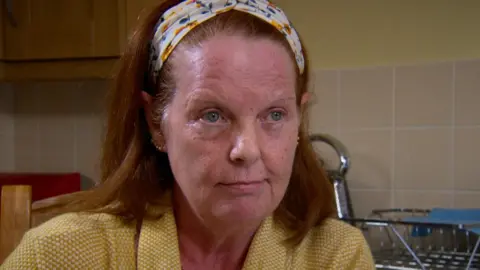
"There was constant noise - the machines were always going," she said.
Caroline remembered being taught to use a presser the size of a kitchen table.
She pointed out that the labour would have been even harder for women who had been there in previous decades because "there were no machines - it would all have been hand work".
"Some of those women were in St Mary's from when they were young girls, stayed for many years, and died there.
"I know a few of them who did go out, but because they were institutionalised for so long, they couldn't cope. So they had to go back in."
The researchers found that women in the Good Shepherd Laundries did a full week's work without pay until the 1970s - when they received "modest amounts" of "pocket money".
Caroline suggested one issue that needed to be investigated was the extent of the laundry's commercial work.
"In this city, the Catholic Church had this town wrapped up," she said.
"Businessmen knew what was going on in there, but it was all kept hush-hush."
But she said the main issues were adoption, with many women saying they were made to give up their babies, and the practice of assigning new names to women when they went into laundries.
"Women's identities were taken away.
"Women were ashamed and they shouldn't have been ashamed."
The researchers identified a number of other matters which they believed warranted further investigation.
These included burial records for women and children, and high infant mortality rates - particularly from the 1920s until the 1940s.
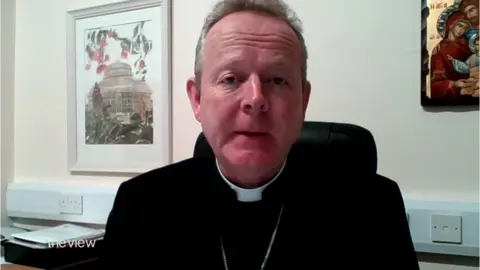
There are also questions about the role of state agencies as well as religious organisations.
In January, the head of the Catholic Church in Ireland, Archbishop Eamon Martin, apologised to survivors and said the church would fully support an inquiry.
He also said victims should be entitled to compensation payments.
The Good Shepherd Sisters said they would offer the investigation their "fullest cooperation" and they regretted they "could not and did not always meet the multi-faceted needs of these women".
Fionnuala Boyle said the inquiry should expose the hypocrisy of the system, right wrongs and correct history.
"You had people with pious sensibilities who wanted everybody else to live by a strict moral code.
"Their morality was failing abysmally - but they didn't recognise that.
"This is their opportunity to ask for forgiveness and to say to people, 'we believe you'."
